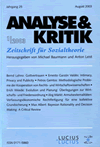Suchergebnisse
"Ulrich Steinvorth"
Titel: The Right to Work and the Right to Develop One's Capabilities
Autor: Ulrich Steinvorth
Seite: 101-113
Abstract: I understand the claim that there is a right to work as the claim that involuntary unemployment is an injustice that requires of justice enforcement institutions to stop it. I argue that in present conditions of high productivity it is more consistent with the liberal tradition to proclaim a right to develop one’s capabilities than a right to work. The steps of my argument are: (1) An important though not the only reason for considering unemployment unjust has been what I call the Promethean idea of society. (2) The Promethean idea is implied by the liberal idea of rights. (3) There are two conceptions of the Promethean idea, the centralist and the autonomous one. (4) Only the latter is acceptable. (5) Involuntary unemployment is unjust even if the dole is decently high. (6) The injustice of unemployment can be stopped only by institutions that enable everyone to use their capabilities in realizing the Promethean idea. (7) One such institution is basic income. (8) As employment is not necessary for survival, we should replace the right to work with a right to develop one’s capabilities.
Titel: Reply to Schlothfeldt
Autor: Ulrich Steinvorth
Seite: 119-120
Abstract: Recognition is an important function of labour, as Schlothfeld claims, but only under given capitalist conditions. It is the very point of the introduction of basic income, if embedded in a suitable education system, that it would allow people to receive recognition from all kinds of activities they regard as meaningful rather than from stultifying wage labour.
Titel: On Critical Theory
Autor: Ulrich Steinvorth
Seite: 399-423
Abstract: I propose a conception of critical theory that is an alternative to that of the Frankfurt School and Habermas. It is based on the assumptions that critical theory is not unique but started off with the 5th century BC movement of the sophists that aimed at an understanding of society free from superstition and prejudice, can be better understood by considering the history of social thinking, does not look for knowledge for knowledge’s sake but for solving practical problems, distinguishes basic social problems from dependent problems, looks for and defends a value to guide it both in its research and its solutions, prefers the value of capability development to that of happiness.
Titel: Kann das Grundeinkommen die Arbeitslosigkeit abbauen?
Autor: Ulrich Steinvorth
Seite: 257-268
Abstract: I agree with Van Parijs that a theory of justice must meet the condition of indicating institutions that eliminate compulsory unemployment, but argue that his basic income is another form of unemployment compensation with all the disadvantages such compensations suffer from. In particular, it does not advance real freedom, but is liable to contribute to narrow political ends. I indicate an alternative and explicate, since Van Parijs disregards it, the right to work and its basis in the common property of natural resources. Finally, I compare the two competing conceptions of a good life that underlie his recommendation of a basic income and my rejection of it.
Titel: Steiner's Justice
Autor: Ulrich Steinvorth
Seite: 21-34
Abstract: Hillel Steiner is a libertarian who takes the equal right to natural resources seriously. Though there are objections to some of the conclusions he draws from this right, his approach might avoid the vices of liberalism and socialism and combine their virtues.
Titel: Macht oder Methaphysik
Autor: Ulrich Steinvorth
Seite: 155-169
Abstract: Our acting and thinking can be guided by two ends which may combine but are irreducible nevertheless: the end of satisfying one's interests and the end of distinguishing between true and false, right and wrong. Recognition of the difference between these ends led philosophers before the modern age to contrasting the life of power and the life of spirit or mind. Modern philosophers, in particular pragmatists, utilitarians and communication theorists, tried to show that truth and justice can be conceived of without implying an opposition to power and mind. I argue that they are wrong.
Titel: Modellkonstruktion und empirische Überprüfbarkeit in Marx' "Kapital"
Autor: Ulrich Steinvorth
Seite: 164-181
Abstract: One of the first objections raised against Marx, Kapital was that it was an idealistic construction apriori of capitalist economy. Since Marx agreed that his book could seem to be so, we may assume that the analyses of Kapital are not only empirical. I try to show that (1) the analyses of the first chapters of Kapital give a conceptual construction of a model of commodity exchange made up both of generally recognized and of new definitions of commo-dity exchange, (2) that the model cannot be used for predicting the end of capitalist economy but that (3) it can be applied to reality because (a) the generally recognized definitions correspond to the ordinary usage of the words, (b) the new definitions are in accordance with true empirical statements about capitalist exchange, (c) the model has allowed true predictions about capitalist economy to be deduced, and (4) that therefore it can be used as a reason for putting an end to capitalist economy.

Work and Social Justice
2009 (31) Heft 1
Guest-Editor: Carsten Köllmann
Editorial
The labour market is among the most contested fields of political argument and conflict in our time. Public criticism of increasing wage inequalities and especially of excessive management pay is, notwithstanding its popularity, only a symptom of more fundamental changes going on in the labour market and in society at large. The conditions and the very meaning of work rank high on the agenda of Western societies. Persistent mass unemployment, coupled with an increasing number of working poor, co...

Rechte / Rights
1995 (17) Heft 1
Editorial
Kaum eine andere soziale Tatsache ist prägender für das Leben der Menschen in den heutigen Demokratien und Verfassungsstaaten als die Existenz verbürgter Rechte. Der Kern dieser Rechte besteht in der Garantie grundlegender individueller Freiheiten. Sie gewähren einen persönlichen Autonomiebereich, der vor Eingriffen und Ansprüchen anderer Individuen und der Gemeinschaft prinzipiell geschützt ist. Für viele Menschen in der westlichen Welt sind individuelle Rechte zu selbstverständlichen ...